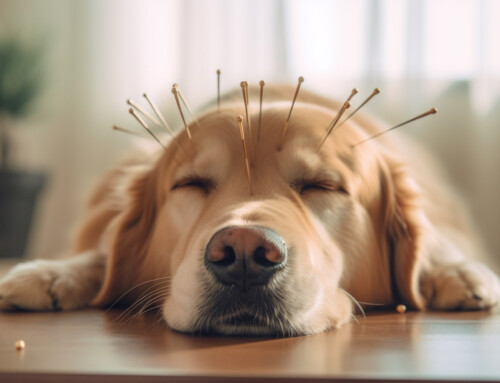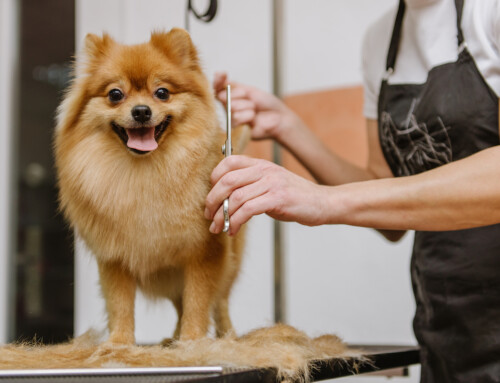While flea season is year-round here in Georgia, spring is the prime time for these little pests to start popping up. We’re all spending more time outside with our pets, and if your cat or dog is not taking monthly flea prevention, you’re at risk for a flea infestation this spring season. The good news is that there are actions you can take to prepare and protect your entire household.
Spring Flea Season: Understanding the Flea Life Cycle
To prevent and get rid of fleas in the spring, you must first understand their life cycle.
Female adult fleas feed on the blood of hosts (such as your family, your cat, or your dog) and then lay 40 to 50 eggs daily. Eggs take about two weeks to hatch and will fall off your pet as they move around your home.
From there, the eggs become larvae. Approximately two weeks later, they spin a cocoon and become pupae.
At this point, the cocoon becomes very sticky and covered with dirt and debris, which makes it nearly undetectable to the homeowner. During this phase, the pupa is almost impervious to chemicals, which is one of the many reasons why fleas are so hard to get rid of!
The Right Environmental Conditions
Environmental conditions must be just right for the pupa to become an adult. Warmth, humidity, and vibrations will trigger the eggs to hatch.
What does this mean for you? Imagine the following scenario:
Your family decides to go on vacation. Before you leave you turn down the heat in your home (no sense in running up the bills!), then you drop your dog or cat off at a boarding facility and enjoy your time away. Meanwhile, your home sits cool and undisturbed while flea larva spins their cocoons.
After vacation, you bring your pet home and turn your heat back on. Over the next couple of weeks, life resumes. Your family breathes moisture and carbon dioxide back into the air and your movement causes subtle vibrations- creating the perfect environment for the pupae to hatch.
When you start noticing fleas shortly after your trip, you’ll probably assume that your pet picked them up at the kennel (which is possible!) but as you can see this might not be the case. Your absence just created the right conditions for your fleas to make their presence known.
Unfortunately, you don’t have to go away on vacation and come home for a flea infestation to occur. These sturdy little creatures know exactly where to hide and how to thrive and one of the most common places you could find fleas is in your own backyard.
Flea Prevention Starts with Keeping Wildlife Away
To understand why you’re attracting fleas, it is important to know that fleas don’t enter your yard on their own; warm-blooded animals carry them onto your property. Therefore, the best way to prevent fleas is to discourage wildlife.
Wildlife can be attracted to your yard by the following:
- Food- There is an endless supply of tasty treats in your yard that can attract flea-carrying animals. Plants, vegetation, smaller animals, even bugs and grubs will all attract predators. While you can’t eliminate every food source, keeping up with routine lawn maintenance such as weeding and mowing will prevent overgrowth that animals can feast on. Keeping your exterior trash in sealed containers is another easy way to prevent your yard from becoming a wildlife buffet.
- Water- Do you have standing water on your property? Decorative ponds, birdbaths, even unsuspecting puddles will all attract thirsty animals and their tagalong fleas. If you really want to deter pests, consider removing your backyard oasis, but at the very least keep your gutters clean and free-flowing to prevent buildup.
- Shelter- Many critters, especially rodents, prefer a yard with hiding places. Think like an animal and survey your yard for potential hiding spots such as overturned buckets, terracotta pots, and woodpiles. Seal up holes and crevices on the exterior of your home, garage, and shed so animals can’t gain entry.
But what if it’s too late, and fleas are already in your yard? You’ll need to treat your yard accordingly as well as take swift action for your pet.

Puppy Retriever Scratching fleas in the park
Treating for Fleas in the Spring
If you suspect that fleas are coming from your yard, you’ll need to eliminate the source for each stage of the flea’s life cycle—which is no easy task.
The best course of action is to hire help from a professional pest control company. They will know exactly what products to use to safely stop fleas in their tracks and prevent them from coming back.
But if you prefer to tackle the challenge on your own, there are some natural methods you can try first.
Flea Baths
Bathing your pet in distilled white vinegar can be an effective way to deter fleas since they hate vinegar’s taste and smell. Unfortunately, it can be an unpleasant odor for your family as well.
For a more pleasant flea deterrent, try adding about 10 drops of clove and lavender essential oils to your pet’s shampoo and wash as normal. Clove extract contains Eugenol, a natural pesticide that kills fleas and ticks on contact.
Traditional Dawn dish soap is another gentle way to rid your pet of fleas. Just lather it on your pet and rinse well.
Yard Sprays
Dawn dish soap and water is a great way to naturally get rid of fleas in your yard as well.
- Pour 1 oz of dish soap and water into a garden sprayer.
- In the evening, spray your yard all over.
- The next morning, check for fleas. Spray again if needed.
- You may need to repeat the process every 10-12 days to kill flea eggs that may not have hatched yet.
Flea Prevention Treatments for Your Pet
We’ve discussed several ways to get rid of fleas once they occur, but the best time to attack fleas is before they start. Using flea prevention treatments year-round will ensure that you won’t have to mess with sprays and special baths during the spring flea season.
Sounds great right? But what kind should you use?
You’ll want to discuss flea prevention treatment with your veterinarian to make sure you are getting the best product for your pet’s individual needs, but some of the most common treatment options include:
- Advantage Multi for Dogs: This is a monthly treatment that is safe to use in puppies 7 weeks and older that weigh at least 3 pounds. This product is not safe for dogs that are pregnant or nursing.
- Pros: Eliminates six types of parasites including heartworm.
- Cons: Does not work for ticks.
- Front Line Plus for Dogs: This is another monthly treatment that is safe for use on puppies and dogs at least 8 weeks old weighing at least 5 pounds. This product is also safe for pregnant, breeding, and nursing dogs.
- Pros: Effective in killing flea eggs, flea larvae, ticks of all stages, and chewing lice for one month. Fleas don’t have to bite the dog for it to work.
- Cons: It will not prevent parasites other than chewing lice, fleas, and ticks.
- Flea Collars: Flea collars are simple plastic collars that fasten around your pet’s neck and can prevent fleas for up to six months. You should read the directions carefully for the brand that you choose but most are safe for cats and dogs as young as 7 weeks. Most are not safe for pregnant or nursing animals.
- Pros: Collars are cost-effective, long-lasting, and easy to use.
- Cons: The product can lose its effectiveness if it gets wet. Collars must remain on your pet constantly to fully protect them. Some animals and humans may have an allergic reaction to the collar’s chemicals.
Watch out for Flea Allergies During Spring Fleak Season
Lastly, no matter what methods you use to battle fleas this spring, it’s important to keep an eye on your pet for signs of flea allergies such as:
- Excessive itching
- Bald spots and patches of missing fur
- Red, warm or painful rashes, especially around the legs, hind end, and tail.
If you notice any of these symptoms contact Mainstreet Veterinarians of Stone Mountain right away. We can provide medication to help relieve the itching and pain from flea bites. We can also recommend some great products to prevent fleas from bothering your pet again in the future. Contact us today to learn more and prepare for the upcoming spring flea season. Click here to learn about our March monthly specials.








